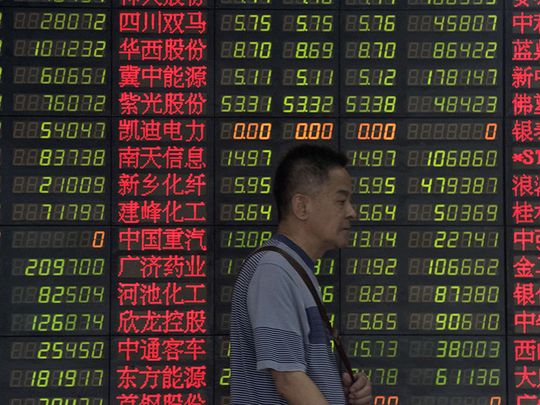
Dubai: Although stocks in China plummeted, as trade resumed post-holidays, the move was not as bad as one feared.
For this investors should partly thank the central bank for injecting liquidity to the markets, analysts say.
This helped prevent the potential crash of mainland-listed Shenzen and Shanghai stocks.
“It has been an orderly start to trading in China’s market thanks to the calming liquidity injections offered up by the central bank, which are tempering the market’s most immediate concerns, the fear of a crash at the open,” said Stephen Innes, chief market strategist at AxiCorp. “It’s not the earthquake at the open but rather the aftershocks that drives risk sentiment on Monday.”
May get worse
However, Innes added that market conditions will mostly get worse before improving. With experts saying that the rapidly-spreading Wuhan coronavirus outbreak looks increasingly like a pandemic, with the number of deaths on the mainland surging past 350 and infecting more than 17,200, the cause for concern remains high.
Hong Kong’s Hang Seng index, which faced the brunt of the sell-off the last few days of trading, edged up 0.1 per cent. Elsewhere in Asia, Japan’s Nikkei fell 1.01 per cent while the Topix index also declined 0.7 per cent. South Korea’s Kospi closed largely unchanged. Meanwhile, shares in Australia tumbled as well, with the S&P/ASX 200 closing 1.34 per cent lower as shares of major miner BHP fell 2.9 per cent.
The falling share prices in China come after global markets were rattled by the epidemic in recent days. Although Wall Street’s Dow, S&P 500 and Nasdaq indices recorded steep declines on Friday – its worst week since October – shares were seen up on Monday. Dow Jones Industrial Average, S&P 500 and Nasdaq futures were up about 0.6 per cent each, indicating gains when trading starts Monday morning.
China plummets
The coronovirus outbreak comes as China’s economy, which is the second largest in the world after the US, is slowing, following the trade war between Washington and Beijing. Stocks in mainland China plummeted more than 7 per cent on Monday as they returned to trade following an extended holiday.
The People’s Bank of China (PBOC) lowered short term interest rates as part of its attempts to relieve pressure on the economy from the rapidly spreading virus. It is also pumping an extra money into the economy, a move aimed at ensuring there is enough liquidity in the banking system.
“While this will be the largest single-day addition since 2004, it implies a mere net injection of 150 billion yuan as commercial banks are scheduled to repay 1.05 trillion yuan of funds on Monday,” analysts at DBS Group Research wrote in a note. “The authority may need to inject more cash in the rest of the week via reverse repo and/or medium-term lending facility to soothe market nerves.”
The PBOC also said it could make more cash available throughout the week, as Chinese financial regulators forecast the impact on the country’s already slowing economy will be “short term”.
China saw economic growth of 6.1 per cent last year - the weakest expansion in around three decades. A partial trade deal easing tensions was signed earlier this month, but most tariffs remain in place.












